Vivaldi Tips
A huge collection of Vivaldi browser tips, tricks and hacks.
Tip #488
mai 14, 2024
Create a new Workspace from a selection of tabs.
Have you cumulated a set of tabs that you would now like to move to a new workspace? Instead of first creating a new workspace and then moving the tabs, you can also create a new space while you moving tabs.
To create a new workspace from open tabs:
- Select the tabs you want to put in the workspace.
- Right-click on one of the selected tabs to open the context menu.
- Select Move # Tabs > Workspace > Create Workspace with Selected Tabs.
- Give the new workspace a name and select an icon for it.
- Click « Create ».
Tip #487
mai 13, 2024
Import your feeds from other clients to Vivaldi Feed Reader.
Copying feeds you follow in other feed reader clients to Vivaldi is easy when the feeds can be exported as an OPML file. You can also move your subscribed feeds from one Vivaldi instance to another that way.
To import feeds:
- Export your feeds as an OPML file from your current client.
- In Vivaldi, go to the Vivaldi menu > File > Import from Applications or Files.
- From the dropdown menu, select « Feeds (OPML file) ».
- Click « Choose file » and locate your exported feeds file.
- Review the feeds’ titles and update frequency.
- Click « Add Feeds ».
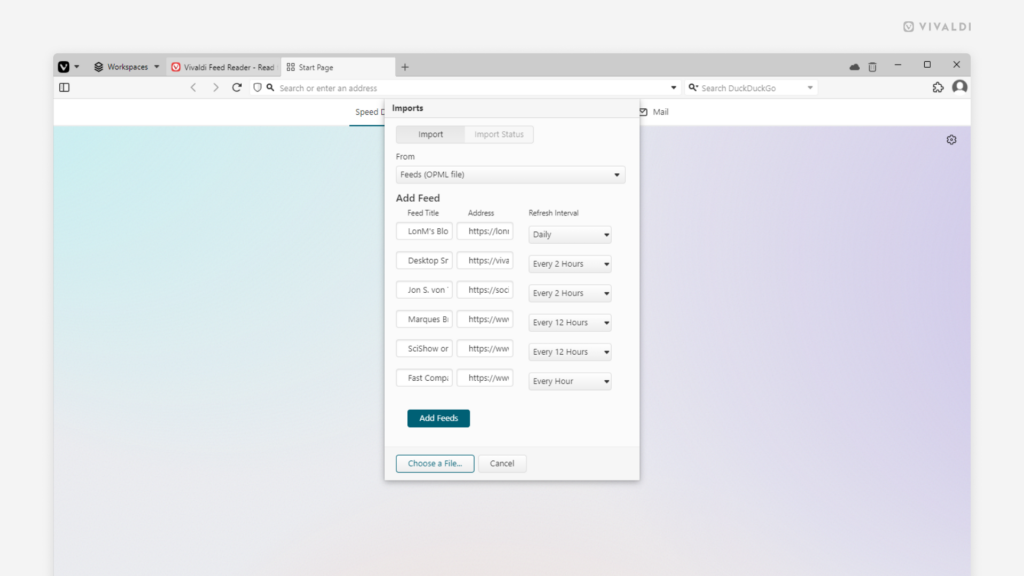
Tip #486
mai 10, 2024
Boost Vivaldi’s performance by enabling the Memory Saver.
Reduce memory usage by automatically hibernating tabs that haven’t been used in a while. This way, active tabs, such as those used for gaming or streaming, can run more smoothly.
To enable the Memory Saver:
- Go to Settings > Tabs > Memory Saver.
- Select your preferred option:
- Disabled
- Automatic (recommended)
- After 1 Hour Idle
- After 2 Hours Idle
- After 3 Hours Idle
- After 6 Hours Idle
Tip #485
mai 9, 2024
Follow hashtags on Vivaldi Social to see posts on the topic on your Home feed.
Since on Mastodon, there aren’t any algorithms deciding what content to show you, you need to actively follow accounts and hashtags to fill up your Vivaldi Social Home feed with interesting posts.
To find which hashtags to follow:
- See which hashtags others have added to their posts.
- Search for hashtags.
- Browse trending hashtags on the Explore page.
To follow a hashtag:
- Click on the hashtag to view recent posts using the hashtag.
- Near the top right corner, click on « Follow hashtag ».
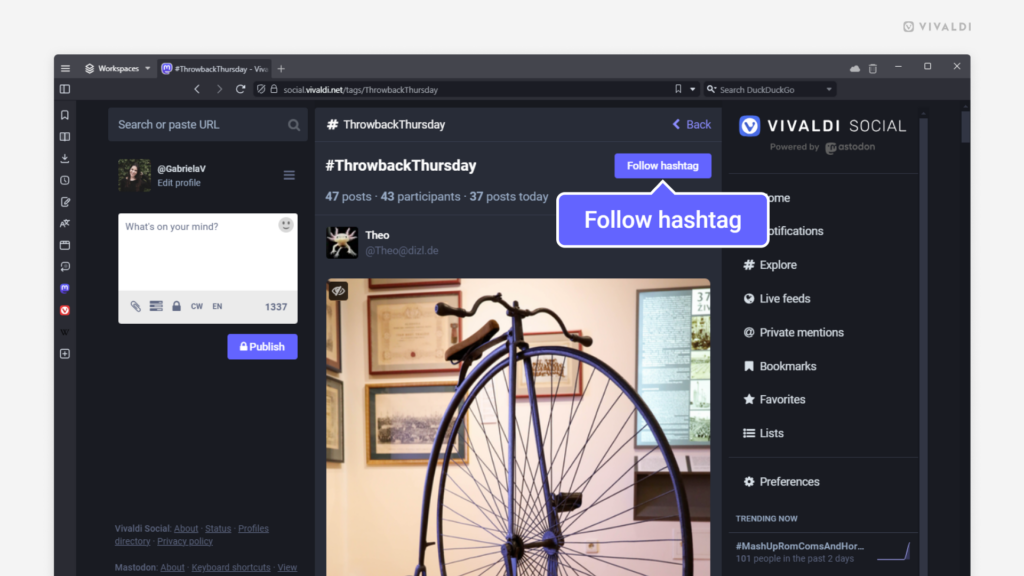
Tip #484
mai 8, 2024
Tinker with Vivaldi’s appearance, all the way down to the menu icon.
On macOS, Vivaldi browser’s main menu is baked into the operating system, but on Windows and Linux you can access the main menu from the  icon in the top left corner of the browser window.
icon in the top left corner of the browser window.
If you wish, you can replace the  Vivaldi icon with a more generic, so-called « Hamburger », ☰ menu icon. To do that:
Vivaldi icon with a more generic, so-called « Hamburger », ☰ menu icon. To do that:
- Go to Settings > Appearance > Menu > Menu Icon Style.
- Select « Menu Icon ».
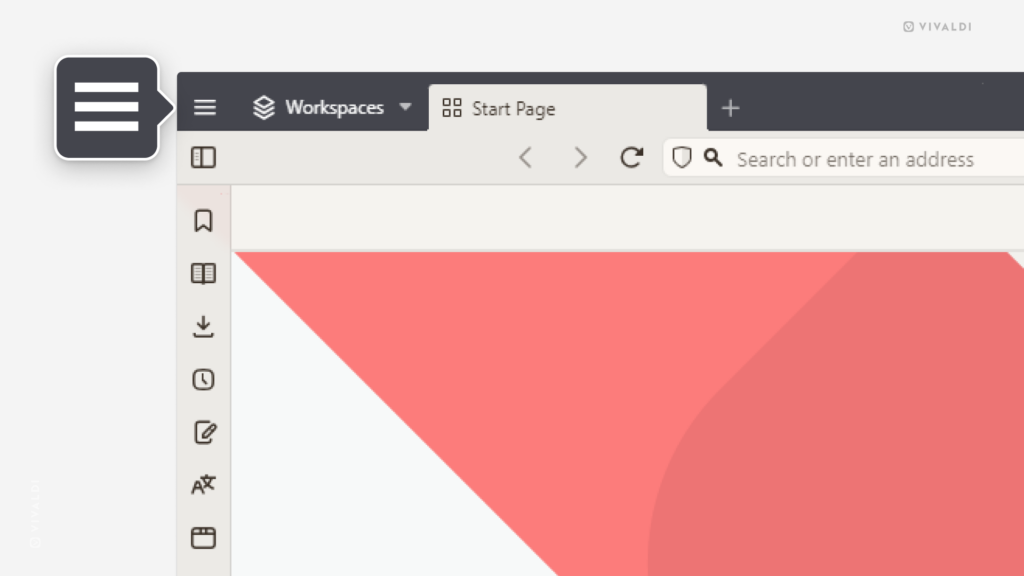
Tip #483
mai 7, 2024
Switch between time periods in the Vivaldi Calendar using your mouse’s scroll wheel.
While viewing and editing your events and tasks in the Vivaldi Calendar you’ll probably need to check things in the past and future.
To do that, you can use the < and > buttons on either side of the « Today » button in the top left corner of the Calendar page or you can press the up and down arrow keys on your keyboard. But there’s a new and very convenient option available in the Vivaldi Calendar – using your mouse’s scroll wheel.
Scroll up to view previous time periods and scroll down to go to the upcoming ones. It works in all Calendar views from single-day view up to the year view.
Tip #482
mai 6, 2024
Set a custom wallpaper for the Start Page in Vivaldi on Android.
The Start Page is a gateway to the web, showcasing all your favorite bookmarks – Speed Dials. Learn how to jazz it up with a cool wallpaper. ✨
Here’s how to set a custom wallpaper on Android:
- Go to Settings > Appearance > Start Page Wallpaper.
- Choose a wallpaper from the presets or select one from your Android phone’s/tablet’s gallery.

Tip #481
mai 3, 2024
Cycle through Tabs either in recently used order or in the order they’re listed on the Tab Bar.
Cycling through tabs using Keyboard Shortcuts or the scroll wheel of your mouse while holding down the right mouse button is a convenient way to switch tabs. In Vivaldi, you have the power to choose in which order the tabs are cycled through.
To make your choice:
- Go to Settings > Tabs > Tab Features > Tab Cycling.
- Choose between « Cycle in Recently Used Order » or « Cycle in Tab Order ».
Bonus! See how to enable the visual Tab Cycler in Tip #267.
Tip #480
mai 2, 2024
Log in to your Vivaldi account from mail and calendar clients using an app password.
If you’ve enabled Two-Factor Authentication for your Vivaldi account, then you need to use an app password when adding your account to mail and calendar clients, such as Vivaldi Mail and Vivaldi Calendar.
To generate an app password:
- Log in to your Vivaldi account on Vivaldi.net and go to the profile.
- Go to the Two-Factor Authentication management page and verify your identity with the login password.
- If you have at least one 2FA method set up, you’ll see an option to create App Passwords, go to that page.
- Select the type of app (mail, calendar, or both) you want to create the password for.
- Give it a name, so you’ll recognize which apps and clients you’ve generated passwords for.
- Copy the password, enter it on the login page of the client, and store the password in a safe location as this is the only time the password will be shown to you.

Tip #479
avril 30, 2024
Use passwords saved in Vivaldi on iOS in other apps.
On iOS, you can use Vivaldi as a password manager to autofill login details in other apps you’ve installed on the device.
To start using Vivaldi as a password manager:
- Go to your phone’s settings > Passwords.
- Verify your identity.
- Go to Password Options.
- From the list of apps, select Vivaldi.
When you’re on the login screen of an app, just select the suggested login credentials you’ve saved in Vivaldi and verify your identity.
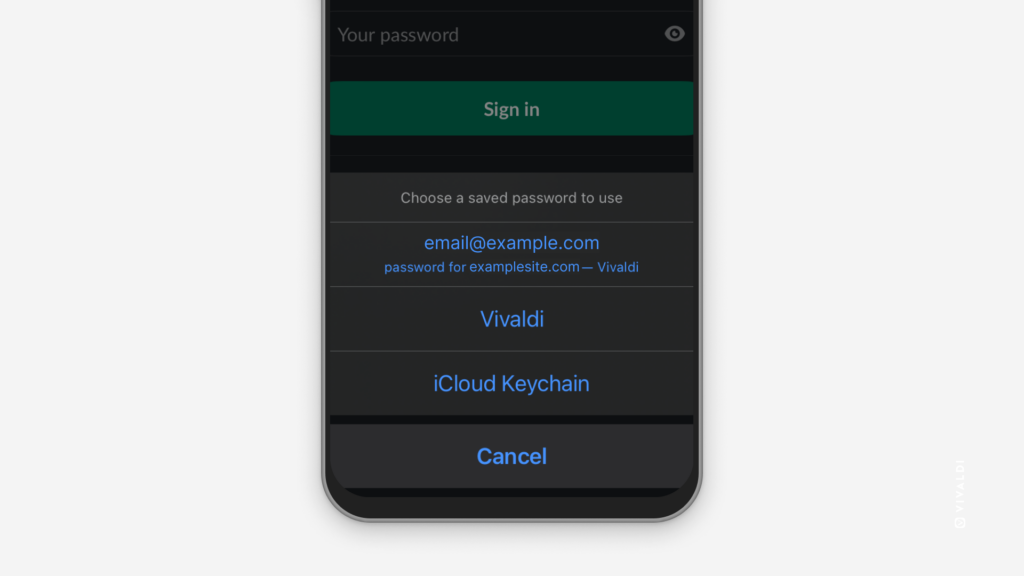
Tip #478
avril 29, 2024
Show off your personality and what your blog is about with a custom header image.
Give your blog on Vivaldi.net a look that reflects you and the topics you’re blogging about – from theme colors to fonts, a logo, and a header image. In this tip, let’s find out how to add the latter.
To add a header image to your blog:
- Click « Customize » on the top menu bar of your blog or go to Dashboard > Appearance > Customize.
- Go to the Header Image section.
- Click « Add New Image » to upload a new image, select one from your Media Library, or search for an image using Instant Images. Alternatively, select a premade color gradient as the header image.
- If needed, change the blog title color.
- Click « Publish » to save the changes.
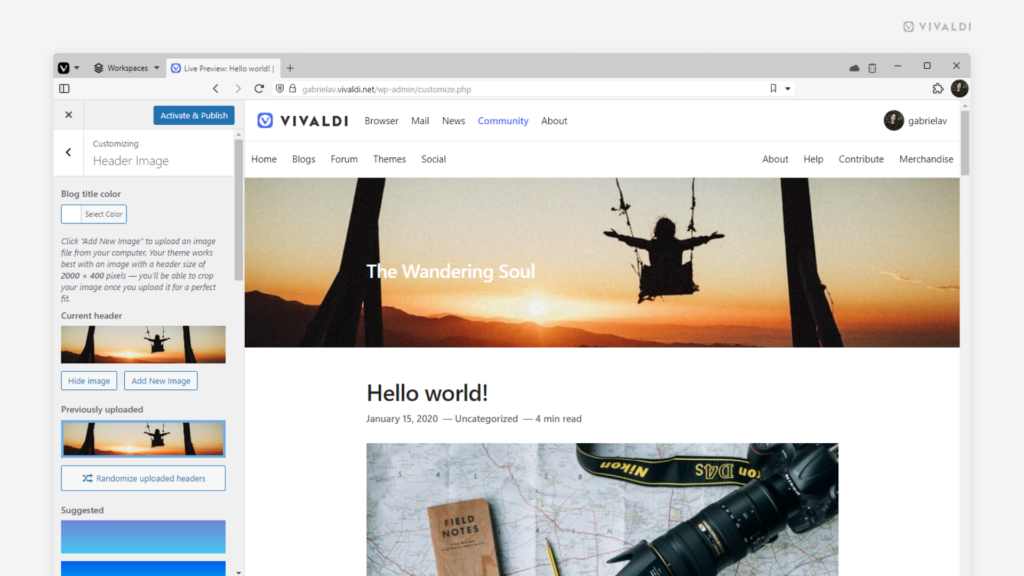
Tip #477
avril 26, 2024
Double-click on the Tab Bar to open a new tab.
Everyone can find a way to open a new tab in Vivaldi that fits their habits. You can click the + button on the Tab Bar, go through the main menu, or use one of the many shortcuts. But there’s another lesser-known option.
When you have the Tab Bar on the side of the window or at the bottom, you can just double-click on an empty area on the Tab Bar and a new tab will open. When you have the Tab Bar on top, then a double-click will maximize the window or revert it to its previous size, but you can get double-clicks to open new tabs on a top positioned Tab Bar when you turn on Native Window from Window Appearance settings.